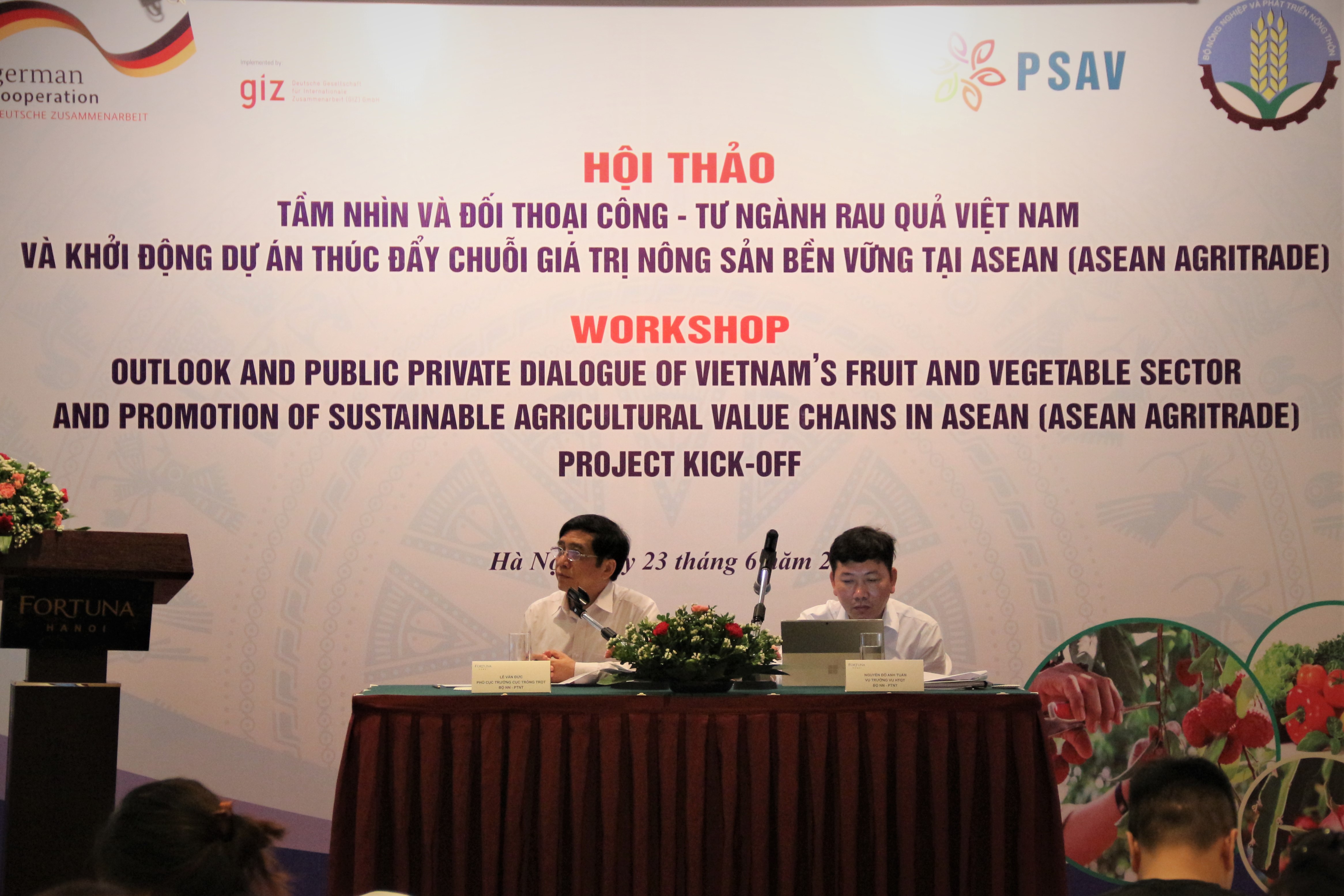- Giới thiệu
- Nhóm Công tác
- Tin tức
- Thông tin về FTA
- Tài Liệu
- Sự kiện
- Liên hệ
Outlook and Public-Private Dialogue of Viet Nam's Fruit and Vegetable Sector
In the morning of June 23, the Ministry of Agriculture and Rural Development (MARD) and the German International Cooperation Agency (GIZ) through the Programme: Promotion of Sustainable Agricultural Value Chains in ASEAN (ASEAN AgriTrade) co-organized an Outlook and Public-Private Dialogue of Viet Nam's Fruit and Vegetable Sector and ASEAN AgriTrade Project Kick-off.

The workshop were attended by MARD agencies (International Cooperation Department, Department of Crop Production, Department of Plant Protection, Agro Processing and Market Development Authority, National Agricultural Extension Center), research institutes, Departments of Agriculture and Rural Development of provinces in the North and Mekong Delta regions, Sub-departments of Plantation and Plant Protection, Centers for Agricultural Extension and leaders of enterprises producing, processing and exporting vegetables and fruits products, certification organizations, technology service providers, input-suppliers, as well as representatives of farmer groups...
Viet Nam has a lot of potential for developing fruits and vegetables, including temperate and tropical products. In recent years, Viet Nam's vegetable and fruit production has experienced very strong growth in both area and output. Thanks to the government’s determination in sector’s transformation, shifting agricultural production model from focusing purely on rice production to fruits and seafood, together with the active engagement local governments in attracting private investment, many Vietnamese fruit and vegetable products such as dragon fruit, mango, rambutan, passion fruit, longan, lychee ... have been exported to fastidious markets such as USA, Japan, Australia…
Promoting production and export of agricultural products, including fresh fruits and vegetables, is one of the strategic objectives in Viet Nam's agricultural development. Fostering production linkage, especially public-private partnerships (PPPs), has been key to improve the fruit and vegetable value chain. The workshop was organized to provide public and private sector partners with an opportunity to exchange information, share experiences and propose solutions to foster cooperation in the application of sustainable standards, improve the quality and food safety to meet the requirements of the domestic and export markets.
Dr. Nguyen Do Anh Tuan, Director General of International Cooperation Department shared about the potential of Viet Nam's vegetable and fruit industry to develop into a holistic industry applying advanced technologies. By 2021, fruits and vegetables global consumption is estimated to reach 317 billion USD. Viet Nam currently supplies nearly 4 billion USD (2019), about 1% of the total global demand. The Viet Nam-EU Free Trade Agreement (EVFTA), which will come into effect in July, is expected to boost the agriculture sector further. EVFTA will open up tremendous new rooms to bring Viet Nam's fruits and vegetables to the EU market.
Mr. Le Van Duc, Deputy Director General of the Department of Crop Production, said that in recent years, the country's fruit and vegetable industry has made significant progress. In addition to the joint efforts of enterprises and local government, the state and associations also contributed significantly to the sector’s development, especially the fruit tree development program which has been implemented over the past 20 years. The Prime Minister recently signed the Decision No. 703/QD-TTg approving the Program on research and development of seed production for agricultural restructuring in the 2021 - 2030 period. 100 trillion VND will be invested, which is expected to be a big push for agricultural restructuring. Besides, many businesses have also proactively set up breeding research institutes, formed closed value chains to meet specific requirements of respective market. It’s time for industry partners to further promote public-private cooperation and find solutions to promote sustainable fruit and vegetable industry development in the coming time.
“Although ASEAN Good Agricultural Practices (ASEAN GAP) for fruit and vegetables were already agreed, the private sector is still lagging behind when it comes to their application. While some member states developed their own standards prior to ASEAN GAP (e.g. VietGAP in Viet Nam, Q-GAP in Thailand and Phil-GAP in the Philippines), this does not guarantee access to global markets. The limited implementation of food standards on quality, safety and sustainability is not only a challenge within most ASEAN member states, but also a major obstacle to economic integration, to linking up with global value chains. The project addresses a regional issue with respect to overcoming barriers to cross-border agricultural trade.” Mr. Daniel Herrmann, Team Leader of AgriTrade Programme, GIZ.
Tin liên quan
PSAV Attends the 30th Anniversary Celebration of Cargill Vietnam2025/10/23
Plant health management helps increase coffee yield up to 15%2025/10/16
An Giang to host 2025 OCOP forum for sustainable development2025/09/25
Viet Nam and France foster cooperation on blue economy and sustainable environment2025/09/29
Agriculture and Environment exhibition ready for National celebration2025/08/27



 Điều lệ hoạt động
Điều lệ hoạt động



















































